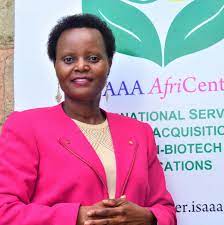By Wahinya Henry
Nairobi, Kenya: Kenya is among six countries from Africa that will be represented at a five-day continental scientific conference in Nairobi.
The Africa Biennial Biosciences Communication (ABBC 2021) symposium will run concurrently across Ethiopia, Ghana, Kenya, Malawi, Nigeria, and Uganda.
The platform that is the fourth one to be held in the continent will present a platform for biosciences stakeholders to actively exchange experiences and best practices towards improving bioscience communications regarding biotech crops.
Due to COVID-19 uncertainties, the symposium has adopted a hybrid mode – in-person for biotech-adopting countries – Ethiopia, Kenya, Malawi, Nigeria, Ghana, and Uganda that are on the cusp of commercializing their first biotech crops.
Director of Nairobi-based Center for International Service for the Acquisition of Agri-biotech Applications (ISAAA), Dr. Margaret Karembu, and the rest of the international participants will join virtually.
According to Dr. Krembu, The ABBC 2021 Symposium, which is the 4th series, will run under the theme “Accelerating Africa’s Biotech Tipping Point: Taking Stock and Celebrating the Gains.”
Reflections on the progress that African countries have made in the adoption of biotech crops will be discussed and strategies on how to harness the gains for the continent’s journey to self-reliance developed.
The outcome, to be presented to the African Union relevant organs, will act as a catalyst to strengthen linkages between research, production, and value-addition of our agricultural commodities with a focus on agri-biotech crops and those developed using new breeding tools.
The ABBC symposium, which is an African-based and African-led platform, provides an opportunity to interrogate innovative communication approaches to address gaps in communicating bioscience technologies and innovations.
It plays a fundamental role in addressing pressing communication issues needed to propel biosciences innovations in the continent.
Being the first of its kind in the region, it plays a fundamental role in addressing pressing communication issues needed to propel biosciences innovations in Africa.
According to Dr. Karembu, the forum is important because understanding emerging technologies and innovations in Africa will in the future either hamper or facilitate up-take.

The advanced technologies, emerging genetic technologies Dr. Karembu was alluding to include genome editing, among others that are attracting a lot of attention as they enable faster, easier, cheaper, and more precise changes to DNA.
According to her, genome editing holds great promise and is set to transform the healthcare and agriculture sectors globally.
“Given the precision, affordability, and potentially offered for a quick win, Africa stands to benefit most,” said Dr. Karembu.
Biotech experts note the world faces intractable challenges, as the human population increases towards a likely 9.7 billion by 2050 and climate change raises additional problems for agriculture, the environment, and health.
Genome editing and other modern biotechnologies, while not being the only solution to these challenges, offer great potential in addressing specific concerns in food production, nutrition, health interventions, environmental restoration, and conservation.
According to Dr. Rufus Ebegba, Chair, Africa Union Biosafety Regulators Forum, advancement in modern biotechnology has led to genome editing, a new technology that enables alteration within the living system of an organism to achieve a particular characteristic –such as editing the gene that causes diseases.
“As this is a new technology, there is a need for proper communication to facilitate its clear understanding and to erase any misconceptions about it.
He regrets African countries have always been slow in adopting new technologies.
“There is a need for the region to be bold in the adoption of beneficial technologies like genome editing. To facilitate uptake, regulations must be put in place and the risk and benefits of the technology communicated to the public.”
The ABBC is a forum for stakeholders to come up with strategies on how this technology can be adequately communicated.














